Before we get into this story — which I will share in multiple parts over the next several weeks — I must give you some background information.
First of all, the heart of the story where the focus is on the “mistress,” who guided the station through its first 20 years … 1934 through 1954 … which were to be its “glory days” and earning it the distinction of being one of the greatest stations to ever grace the American radio dial … is a re-print of an article published in 1983 — a photocopy of which I have had in my hands ever since the day it was published.
It appeared in the November 21, 1983, issue of the long-defunct industry publication Television/Radio Age …and was written by one Richard Pack, who can tell the story better than most anyone else, as he was part of WNEW-AM’s inner circle working under “the mistress” as a senior program executive during the later 1940s and early 1950s. (Mr. Pack would go on from WNEW to serve nearly two decades as senior VP of Programming for the Westinghouse Broadcasting Company group of stations.)
I can relate very well to a great deal of what is written here, as I was a regular listener to WNEW during this time period following the Second World War. As we roll out “the story,” I’ll share additional information and thoughts about the station’s origins and history, hopefully bringing enlightenment where pieces of the puzzle may be hazy. Now though, here’s the beginning of Mr. Pack’s article:

She was unique. She was a phenomenon. She was Bernice Judis. Miss Judis. Tudie.
Before too many of her contemporaries have faded from the scene, the history of our business should put her in her proper place among the major figures of American broadcasting, the movers and shakers who have shaped the medium. Paley. Stanton. Sarnoff. Weaver.
Bernice Judis was general manager of WNEW in the years when it was the greatest of all independent radio stations, the leading indie, the sassy station that led the way for non-network stations, creating or developing the program formats and techniques which so many followed.
More than any other outfit, it was WNEW that showed non-network radio how to compete successfully against the network outlets.
The men and women who worked for her at the executive level or on the air, called her Tudie. (The origin of that nickname is obscure.) Lower ranks called her Miss Judis. And outsiders who aspired to be part of her circle mistakenly called her Bernice; she didn’t like that.
Tudie died a few months ago and the skimpy obits in the dailies and the trade papers hardly did justice to this remarkable woman. I suppose that’s understandable, since a younger generation raised on television, probably writes the obits these days.
Most of the press noted that she had discovered Martin Block, the first bigtime disc jockey. Sure. But a great deal more than that deserves to be told.
‘Invented’ disc jockey
More than anyone individual, she was responsible for “inventing” the disc jockey and the music-and-news radio format. For all-night programming. For musical station IDs. For news around-the-clock, five minutes every hour, 24 hours a day. For realizing the importance of the out-of-home audience and forcing the creation of out-of-home ratings.
And much more.
Today, some of these achievements may not seem substantial, but they must be placed in the context of the times when Miss Judis and WNEW started out. In the years before World War II when there were less than 1,000 radio stations; with few exceptions, the most powerful, the most successful, the most profitable were all affiliated with one of the major networks — with CBS or with the Red or Blue networks of NBC, or, when NBC was forced to divest itself of one of its two networks, with ABC. There was also the fourth, the less attractive network, Mutual. Indies were the poor cousins.
Network was king
Network radio was the medium. For major on-the-air entertainment. For variety, for drama, for comedy, for news, for the dozens of soap operas. What could a station do to compete without a network affiliation? Most of them struggled along marginally, with a mishmosh of personalities, talk, cooking programs, “women’s” programs, etcetera. A few of the more popular even managed to maintain a studio orchestra, usually to back up a popular morning show. They aired little or no news. Remember there were many years when neither AP nor UP serviced radio stations.
Before the advent of the WNEW era, few stations used phonograph records to any extent (one of the problems was the complex legal restrictions, but even these were cleared up in the courts). Platters were not an important program source. When records were occasionally used, it was apologetically: “… and now a phonograph record.” And there were those awful ET’s — which came not from outer space but from the library service of NBC or companies like World Broadcasting which syndicated 16-inch platters with dull instrumentalists and singers; competent musicians, but no stars, usually under “house” names.” … And now folks we hear an electrical transcription, the Manhattan Strings Orchestra in a stirring rendition of Percy Grainger’s ‘Country Gardens’ … “
WNEW’s principal owners were Arde Bulova, the watch tycoon and pioneer radio advertiser (“It’s 9 p.m., Bulova B-U-L-0-V-A Watch time!”) and Milton Biow, head of the ad agency which bore his name. The station was patched together in 1934 out of a couple of New Jersey stations at 1250 on the dial and eventually moved to 1130 (where it still is). Competing in metropolitan New York in that era, at what was then the wrong end of the dial, was tough, because the network 50,000-watt clear-channel powerhouse stations were down much lower. WEAF (WNBC) at 660, WJZ (WABC) at 770, WCBS at 880, WOR at 710. You had to have some compelling and different programming to attract listeners beyond 880. WNEW found the way.
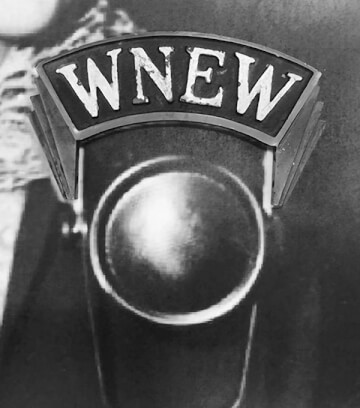
Bernice Judis came in her early 30s to WNEW shortly after it went on the air. Radio experience? None. Show business experience? None. She was a friend of Bulova and Biow; they knew she was bright and having just been divorced, was looking for something to do. So they decided to take a chance on an unknown who had no preconceived notions on how to run a radio station.
She once told me what set her on the right course. Not marketing surveys, not focus groups, not audience studies, but her own tastes — her intuition.
“I built the station around what I myself liked,” she said. “I liked popular music. The rest of the stuff on the radio bored me. I decided that there must be a lot of other women like me who wanted something else besides soap operas, recipes, and housewives hints, and who would prefer music, and plenty of it.

Why did I so relate to the Bernice Judis story? I believe it was her pioneering spirit, using her own tastes as a starting base … and relying on her intuitive senses. As I talk about in my radio life memoir, I was guided by intuition in a number of situations, yet had the benefit of being able to gain an education from several years of listening to stations like WNEW as well as numerous others offering a range of formats prior to having an opportunity to take my concepts to the airwaves.
Part Two comes to this space next week, when I’ll dig into the origins and early years of WNEW — even though Bernice Judis was on the scene … a fair amount transpired before the station evolved into the great powerhouse it remembered as, both programming-wise and being located at 11-3-0 on the dial. We’ll then continue with Richard Pack’s great article.
Image Credits: Bernice Judis photo courtesy of WNEW1130.com, WNEW microphone flag photo courtesy of Biniasz.com
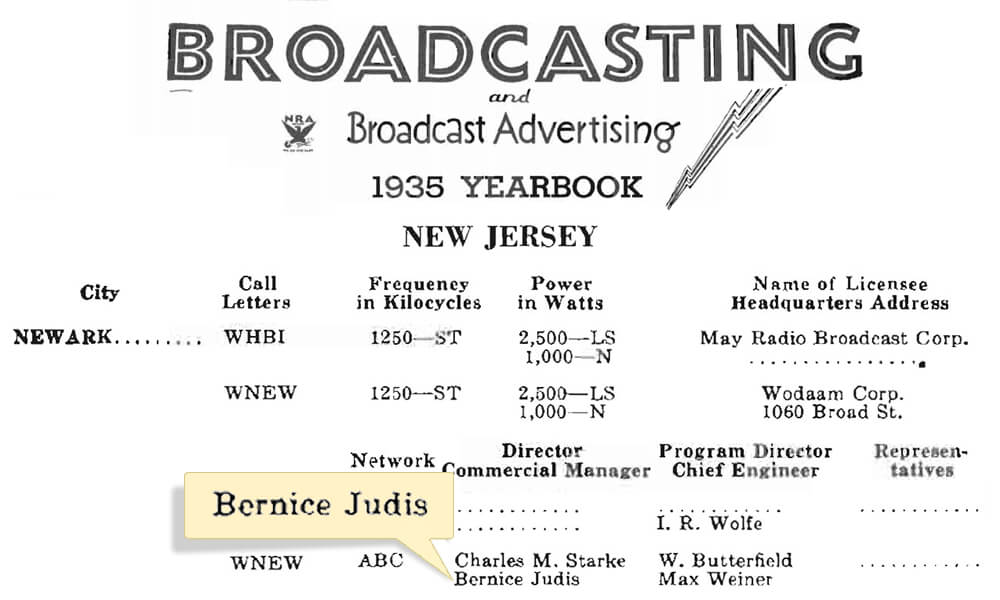
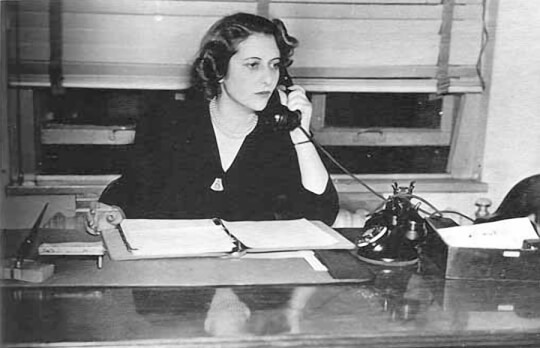

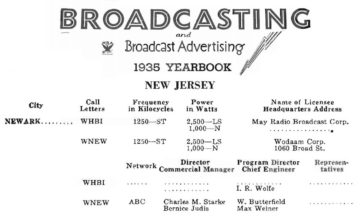
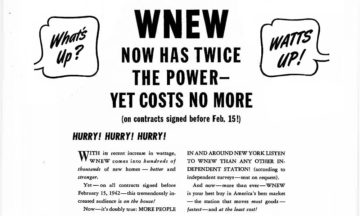


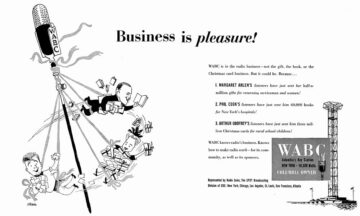
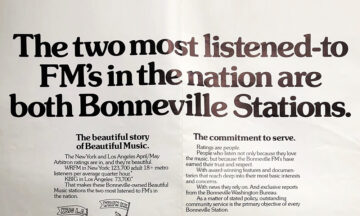

Oh Boy! You have hit on one of my all time favorites. She led the way in music and news. Todd Storz’s invention of top 40 were inspired by WNEW. And jingles! Best ever done. Bring it on!
Thanks Marlin for the history about a legendary station which I never had an opportunity of hearing for any great length of
time but which I'd read and heard about over MY sixty years in broadcasting. The Make Believe Ballroom inspired out
local Salt Lake City's KNAK as well as the years when I was a Top 40 deejay before I got into sales and management at
Bonneville. You didn't know it but I was with McLendon's KTSA in San Antonio about 5 years before my KSL days. I
loved reading about WNEW. I also am a steady listener to Sirius XM (Escape and 50s on 5)….the organization of which
you were a part in recent years.
Always looking forward to your musings. THANK YOU Dick Dixon
Thanks, Dick … trust all is well with you and yours … I’ve never made it to Salt Lake yet.
Bernice Judis fired a future legend, William B. Williams, in 1947. According to Wikipedia, the Daily News reported his aggressive tactics with management as shop steward prompted the firing, but WNEW's official story was that he was caught one night with his feet up on the console wearing bright red socks, which Ms. Judis thought was in horrible taste. Williams was rehired in 1953 after a change in management.
Roddy, from my own experiences and background in management, I would believe that both played a role in his departing. She had very strict standards about many things and, from what I know about Tudie, finding feet on the console would be a definite no-no — sometimes the wrong person gets caught in the rules and you have no choice but take action.
I had that experience in my early days back in the early 60’s in Philadelphia. Things were getting too loose and I was forced to institute a policy of not having friends hang out in the station outside of business hours unless there was an exception which was prearranged. I dropped in at the station on a Sunday afternoon and a person who went on to become a well-known person in the radio industry was on duty … sitting with him was his girlfriend. I had no choice but to terminate him; otherwise the policy would be useless, as it would be ignored by others.
We are friends today, as he went on to be in my position in later times, realizing standards must be set and enforced … or the inmates will end up running the asylum! He’s even talked about our incident in public in recent times.